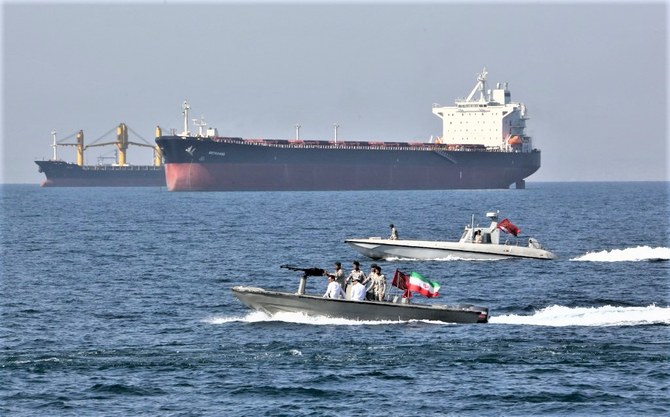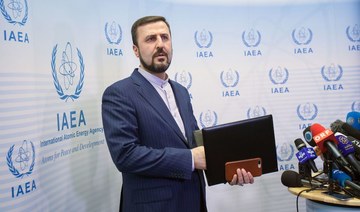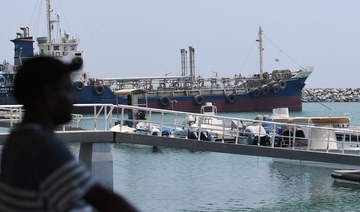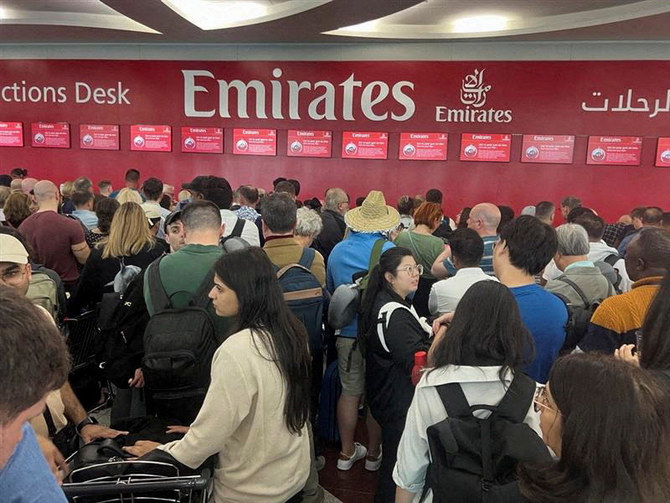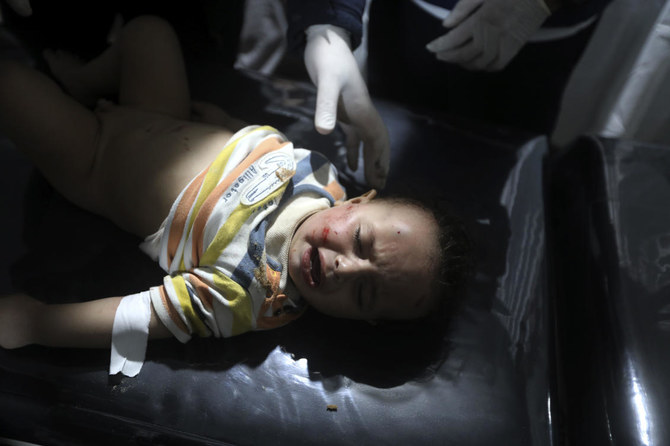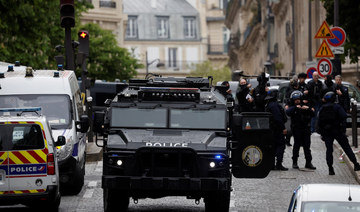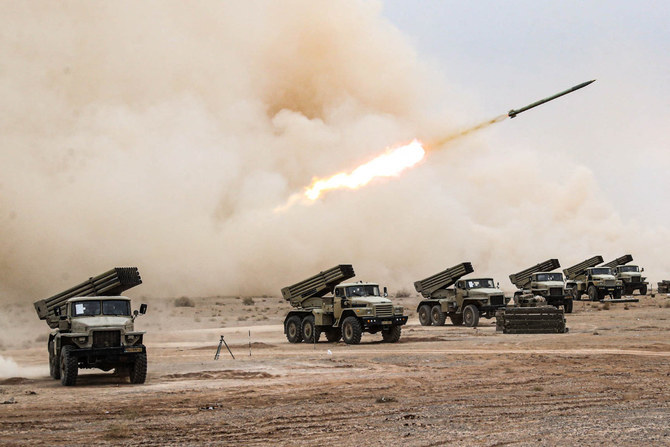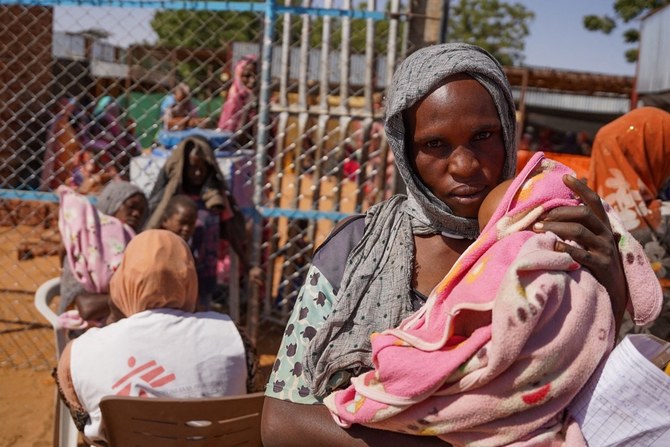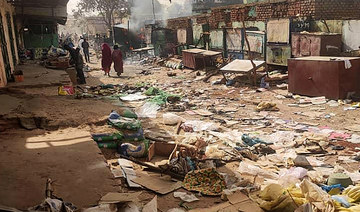TEHRAN/ WASHINGTON: The British government said Thursday three Iranian ships had attempted to “impede the passage” of a British oil tanker in Gulf waters, forcing HMS Montrose — a UK frigate — to intervene.
The incident occurred almost a week after British Royal Marines boarded an Iranian tanker, Grace 1, off Gibraltar and seized it on suspicion that it was breaking sanctions by taking oil to Syria.
US officials, speaking on the condition of anonymity, said Wednesday’s incident happened as British Heritage was at the northern entrance of the Strait of Hormuz.
“The Royal Navy HMS Montrose, which was also there, pointed its guns at the boats and warned them over radio, at which point they dispersed,” one of the officials said.
“It was harassment and an attempt to interfere with the passage,” the other official said.
Iran’s Revolutionary Guards denied on Thursday that they had impeded a British oil tanker in the Strait of Hormuz, the force’s Sepah news agency said.
“There has been no confrontation in the last 24 hours with any foreign vessels, including British ones,” the Revolutionary Guards said in a statement.
“Now an action that does not need ability but some stupidity has been carried out by them,” Rear Admiral Ali Fadavi, a deputy Guards commander, said, according to Tasnim.

“The American government ... and also England .... should not have taken action if they had made the smallest calculation,” he said.
“We had rented this ship and we carried the cargo. Their action was very silly and they will certainly regret it. Our reciprocal action will be announced.”
Britain is concerned about action by Iranian vessels to stop a commercial oil tanker, Prime Minister Theresa May's spokesman said on Thursday, calling for a de-escalation of tensions.
"We are concerned by this action and continue to urge the Iranian authorities to de-escalate the situation in the region," the spokesman told reporters.
"We have a long-standing maritime presence in the Gulf. We are continuously monitoring the security situation there and are committed to maintaining freedom of navigation in accordance with international law."
Britain has recommended all British-flagged ships go to a heightened state of security in the Strait of Hormuz, Sky News reported on Thursday, citing unnamed maritime industry sources.
------
READ MORE
Iranian opposition urges Europe to reinstate nuclear sanctions on Tehran
Trump accuses Iran of secret nuclear enrichment and warns of ‘substantial’ new sanctions
Pence says US action has cut off Iran’s ability to support terrorism
------
A Department for Transport spokeswoman said: "The Department for Transport, as competent authority, regularly provides Security Advice to UK and Red Ensign Group Shipping on how they should operate in areas of high risk."
Threats to international freedom of navigation require an international solution, US Central Command said on Thursday, after three Iranian vessels tried to block a British-flagged tanker passing through the Strait of Hormuz.
"The world economy depends on the free flow of commerce, and it is incumbent on all nations to protect and preserve this lynchpin of global prosperity," Captain Bill Urban, a spokesman for US Central Command, said in a statement.
The Kremlin has called for restraint following a brief standoff between British and Iranian naval vessels near the Arabian Gulf.
Kremlin spokesman Dmitry Peskov told reporters Thursday that “freedom of navigation should be ensured in the Arabian Gulf and the Strait of Hormuz,” which he said was crucial for the global economy. Peskov said Moscow was aware of both Britain’s statement and Iran’s denial that it tried to impede the ship's passage.
Peskov called on “all parties” to show restraint and settle their disputes by negotiations.
Around 20 percent of all oil traded worldwide passes through the Strait of Hormuz.
Opinion
This section contains relevant reference points, placed in (Opinion field)
Meanwhile, French armed forces chief Francois Lecointre said on Thursday that tensions in the Gulf were unlikely to spiral out of control.
“There is a clash of wills underway between the United States and Iran with posturing, reactions, signals and which can from one day to the next get out of control,” Lecointre told CNews television.
“I think it is under control now... I don’t think it can spiral out of control but there can be escalation,” he added.
Earlier on Wednesday, Iranian President Hassan Rouhani said Britain would face “consequences” over the seizure of the Iranian tanker.
Tensions between Iran and the US and its allies have risen sharply since Washington stepped up economic sanctions against Iran and moved to bring the country’s oil exports to zero as part of a “maximum pressure” policy to make Iran halt actions that it said undermined regional security.
Iran has responded to the sanctions by starting to breach limits put on its nuclear activities under a 2015 deal with world powers.
Several oil tankers were attacked in waters near Iran’s southern coast in May and June, for which the US blamed Iran. Tehran denied any involvement.
Last month, Iran shot down a US drone near the Strait of Hormuz, prompting President Donald Trump to order retaliatory air strikes, only to call them off.
The US hopes to enlist allies over the next two weeks or so in a military coalition to safeguard strategic waters off Iran and Yemen, Marine General Joseph Dunford, the chairman of the Joint Chiefs of Staff, said on Tuesday.





